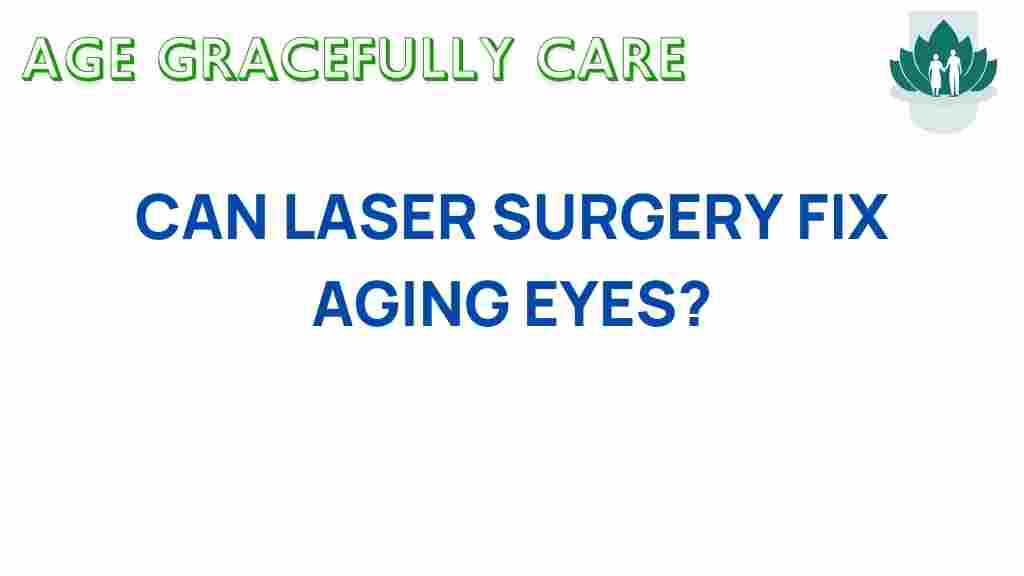Can Laser Surgery Reverse the Aging Process in Your Eyes?
The quest for youthful skin and vitality is a pursuit that spans generations, and with each passing year, advancements in medical technology offer new hope. One area that has seen significant progress is ophthalmology, particularly concerning laser surgery for rejuvenating aging eyes. As we age, our eyes undergo various changes that can affect our vision and overall eye health. In this article, we’ll explore how laser surgery can potentially reverse some of these changes, the various eye procedures available, and what you should know before considering these aesthetic treatments.
The Aging Process and Its Effects on Eye Health
Aging affects every aspect of our bodies, including our eyes. Common age-related changes include:
- Presbyopia: This natural loss of the eye’s ability to focus on close objects usually begins in our 40s.
- Cataracts: Clouding of the eye’s lens that can impair vision.
- Dry eyes: A decrease in tear production leading to discomfort and blurred vision.
- Macular degeneration: A progressive condition that affects the central part of the retina, leading to vision loss.
Understanding these conditions is crucial as they form the basis for why many individuals seek vision correction through laser surgery.
How Laser Surgery Works
Laser surgery encompasses various procedures aimed at correcting vision and rejuvenating the eyes. Here’s a closer look at some of the most popular types:
- LASIK: This procedure reshapes the cornea to correct refractive errors like myopia, hyperopia, and astigmatism.
- PRK: Similar to LASIK, PRK involves reshaping the cornea but is performed on the surface rather than under a flap, making it suitable for those with thinner corneas.
- Laser Cataract Surgery: A modern approach to cataract removal that utilizes lasers for precision and reduces recovery time.
- YAG Laser Capsulotomy: This procedure is used to treat cloudy vision after cataract surgery by creating an opening in the cloudy capsule.
- Laser Eye Rejuvenation: This aesthetic treatment addresses signs of aging around the eyes, including wrinkles and sagging skin, using non-invasive laser techniques.
Benefits of Laser Surgery for Aging Eyes
The benefits of laser surgery in the context of aging eyes are numerous. Some of the key advantages include:
- Improved Vision: Many patients experience significant improvements in their vision, allowing them to perform daily activities more easily.
- Quick Recovery: Most laser procedures offer a short recovery time, with many patients returning to normal activities within a day or two.
- Minimal Discomfort: Many describe the procedures as painless, with only mild discomfort during recovery.
- Long-lasting Results: Results from laser surgery often last for years, making it a worthwhile investment in eye health.
Step-by-Step Process of Laser Surgery
While the specifics can vary depending on the type of laser surgery, the general process usually involves several key steps:
- Consultation: Your ophthalmologist will assess your eye health and determine whether you are a suitable candidate for laser surgery.
- Pre-operative Preparation: You may be advised to stop wearing contact lenses for a period before the surgery. Your doctor will provide specific instructions.
- The Procedure: During the surgery, numbing eye drops are applied. For LASIK, a flap is created in the cornea, and the laser reshapes the underlying corneal tissue.
- Post-operative Care: After the procedure, you will be given instructions on how to care for your eyes and what to expect during recovery.
- Follow-up Visits: Regular follow-up appointments will be scheduled to monitor your healing process and vision quality.
Potential Risks and Troubleshooting Tips
As with any medical procedure, laser surgery comes with its own set of risks. Some potential complications include:
- Dry eyes
- Visual disturbances such as halos or glare
- Overcorrection or undercorrection of vision
- Infection
Here are some troubleshooting tips to consider:
- Follow Instructions: Always adhere to your surgeon’s post-operative care instructions to minimize risks.
- Report Concerns: If you experience unusual symptoms, such as severe pain or significant changes in vision, contact your eye care provider immediately.
- Regular Check-ups: Schedule all follow-up visits to ensure your eyes are healing properly and to address any concerns promptly.
The Role of Medical Advancements in Eye Procedures
The field of ophthalmology has seen rapid advancements, particularly in laser surgery techniques and technologies. These advancements have made procedures safer, more effective, and accessible to a broader range of patients. Key innovations include:
- Wavefront Technology: This technology allows for more precise corrections of refractive errors based on individual eye characteristics.
- Femtosecond Laser: This laser offers greater precision in creating corneal flaps during LASIK surgery.
- Custom Ablation Techniques: These techniques tailor the surgery to the unique shape of your cornea for optimal outcomes.
As technology continues to evolve, medical advancements in eye procedures will likely lead to even better results and safety profiles for patients seeking rejuvenation of their aging eyes.
Conclusion
In summary, laser surgery offers promising options for individuals looking to address the effects of aging on their eyes. Whether you’re dealing with presbyopia, cataracts, or simply wish to refresh the appearance of your eyes, these procedures can have a transformative impact on your eye health and overall quality of life. However, it’s essential to conduct thorough research and consult with a qualified ophthalmologist to determine the best treatment for your unique needs.
For more information about laser surgery and its benefits, visit this resource. If you’re ready to explore your options, consider scheduling a consultation with an ophthalmologist who specializes in vision correction and aesthetic treatments for the eyes.
Remember, taking proactive steps towards maintaining your eye health can lead to healthier, more vibrant eyes as you age.
This article is in the category Health and created by AgeGracefullyCare Team
